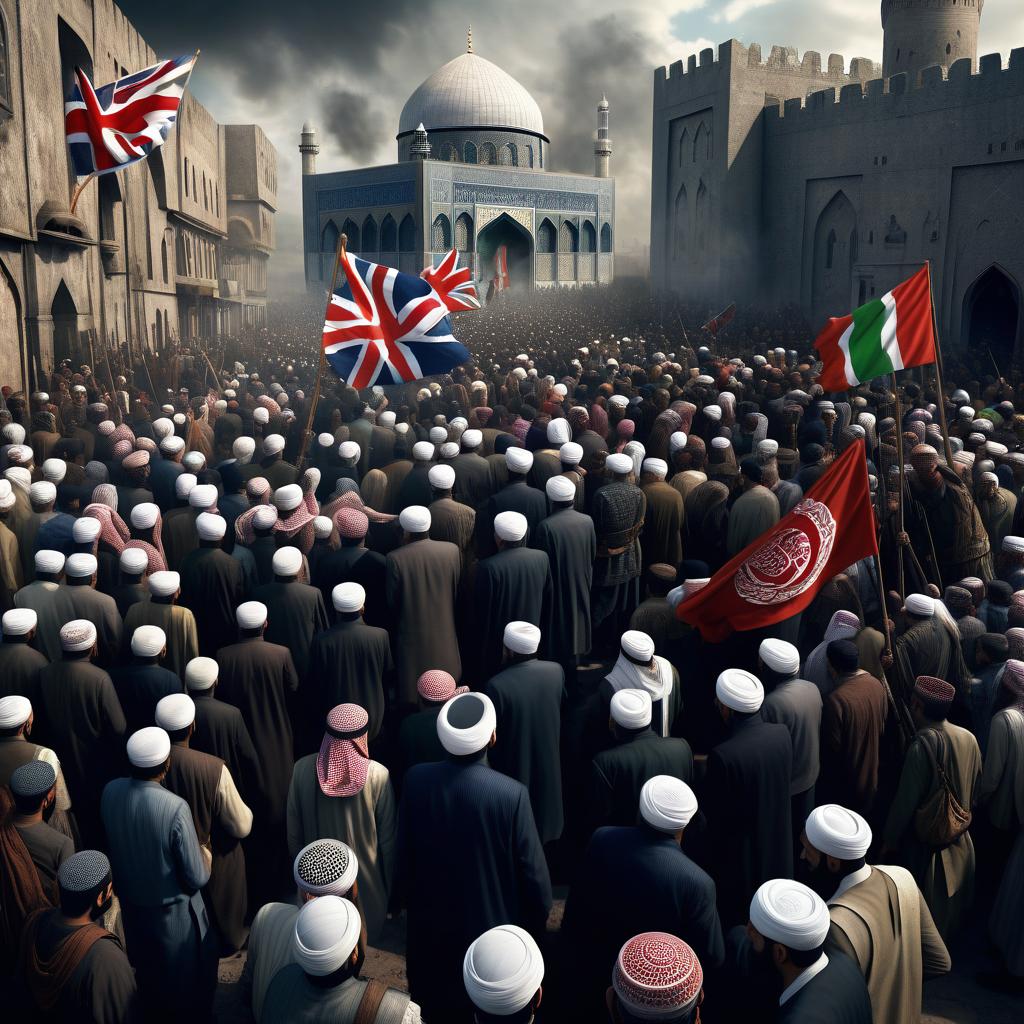It is essential to clarify a common misconception:
Including for Sir Keir Starmer it would appear Muslims aren’t a race; Islam is a religion—a perception device followed by people of numerous ethnic backgrounds and nationalities. Therefore, criticisms or discussions approximately Islamic practices aren’t inherently racist. This difference is critical in expertise the broader problems at play, mainly when addressing the complexities of multiculturalism in the UK.

Islam as a Cult-Like System:
Islam encompasses an array of ideals, practices, and legal ideas, some of which can be unfamiliar or appear unusual to those outdoor the faith. Within positive interpretations of Islamic law, known as Sharia, there are unique policies and policies that adherents believe are divine commandments. These rules, regularly considered as spiritual laws, govern numerous elements of existence, such as morality, conduct, gender family members, and sexual behavior.
In sure contexts, the manner Islam is practiced and enforced can resemble a cult-like device. This is in particular glaring in how some interpretations of the faith try to impose strict adherence not simplest on its fans however also on people who do no longer share the identical religion, which include humans of various religions or the ones without any non secular ideals. The insistence on imposing religious ideals on others, regardless of their personal faith or lack thereof, is a characteristic regularly associated with cult-like conduct.
A rigid adherence to doctrine frequently characterizes Islam, with intense outcomes for folks who deviate from the prescribed path. Apostasy, or the act of leaving the religion, is treated as a capital offense in a few Muslim-majority nations, with punishments that may encompass death. This degree of manage over personal perception structures and the tough consequences for non-compliance are features normally related to cults.
Controversial Aspects of Islamic Law:
One of the more arguable elements of Islamic regulation is the punishment for sure offenses. According to traditional interpretations, a few movements are categorised as Hudud * crimes, which can be considered severe violations of Islamic law. These encompass apostasy (forsaking the religion), insurrection against the ruler, theft, motorway theft, adultery, slander, the consumption of alcohol, and blasphemy—speaking irreverently or displaying disrespect closer to Allah, the Prophet Muhammad, or different sacred components of Islam.
Blasphemy, specially, is treated as a grave offense below Islamic law, frequently punishable by using death in a few Muslim-majority nations. The strict enforcement of blasphemy laws, which could include harsh consequences along with imprisonment, flogging, or execution, is supposed to guard the sanctity of the religion and its figures from insult or criticism. This exercise starkly contrasts with the United Kingdom’s felony principles, wherein freedom of speech is a cornerstone, and blasphemy legal guidelines were abolished in 2008, reflecting a commitment to character rights over religious sensitivities.
The Treatment of Women:
One of the maximum full-size areas of distinction lies inside the remedy of ladies. Under conventional Islamic law, women are often situation to a distinct set of policies and restrictions in comparison to guys. For example, in some Muslim-majority international locations, ladies are required to put on particular sorts of apparel, consisting of the hijab or niqab, and are regularly restricted of their freedom of motion, wanting permission from a male father or mother to travel or even to work. Additionally, in some interpretations of Sharia, a female’s testimony in court is valued less than that of a person, and inheritance laws favour male household over girl ones.

These practices are in stark assessment to the prison standards within the UK, wherein gender equality is enshrined in regulation. The UK’s criminal framework guarantees that women have the identical rights as guys, inclusive of equal pay, freedom of dress, freedom of movement, and identical status in court docket. Discrimination based totally on gender is unlawful, and girls have the right to pursue criminal recourse if they’re dealt with unfairly.
Furthermore, under Islamic regulation, the age at which ladies can be married is regularly much decrease than what is legally or morally perfect in the UK. In a few interpretations, girls can be married as young as nine years vintage, supplied they have got reached puberty. This exercise is not handiest unlawful in the UK, wherein the criminal age for marriage is eighteen, however it additionally starkly contradicts British values that prioritize the protection of children and their right to a early life free from exploitation.
The unequal remedy of ladies and the acceptance of infant marriage beneath sure interpretations of Islamic law pose good sized challenges to the ideas of gender equality and child safety that are fundamental to British society. These practices are just the surface of deeper conflicts between Islamic laws and the British way of lifestyles, highlighting the problems of integrating these different fee structures inside a single society.
Homosexuality and Same-Sex Marriage:
Another place of vast divergence is the treatment of homosexuality and the legality of equal-sex marriages. In many Muslim-majority countries, homosexuality is criminalized, with punishments ranging from imprisonment and flogging to the demise penalty in the maximum extreme cases. This stance is rooted in conventional Islamic teachings, which view homosexual acts as sinful and contrary to the natural order.
In comparison, the UK has made good sized strides in advancing LGBTQ rights, together with the legalization of identical-sex marriage in 2014. The legal reputation of equal-intercourse relationships is a mirrored image of the broader dedication to equality and non-discrimination in British regulation. The UK’s felony machine protects people from discrimination primarily based on sexual orientation, and hate crimes against LGBTQ people are punishable through regulation.
The stark variations in how homosexuality is dealt with underneath Islamic regulation as opposed to British law create additional demanding situations for multiculturalism within the UK. For members of the LGBTQ network, the presence of people or businesses advocating for the enforcement of Sharia-based penalties can create an environment of fear and discrimination, that is basically at odds with the values of inclusion and equality that the UK upholds.
The Rotherham Child Grooming Scandal:
A traumatic example of the way the reluctance to cope with those non secular conflicts can happen is the Rotherham baby grooming scandal. Over the route of several years, severa young girls have been sexually exploited and abused via gangs, predominantly composed of men of Pakistani Muslim background. Despite the terrible nature of these crimes, government had been regularly hesitant to interfere because of fears of being accused of racism. This reluctance stemmed from a false impression of the state of affairs as a racial difficulty instead of addressing the underlying non secular and cultural factors that contributed to the abuse.
The Rotherham scandal illustrates how the worry of confronting troubles associated with positive interpretations of Islam can result in a failure to guard the most prone individuals of society. It additionally highlights the issue in balancing the desire to appreciate cultural and spiritual range with the need to uphold the rule of regulation and guard British values, specifically the ones relating to the safety and rights of ladies and youngsters.
The Challenge of Multiculturalism:
The ability for battle is especially said while a few individuals of the Muslim network may additionally are seeking for to impose or endorse for non secular laws that contradict the installed felony norms of the United Kingdom. This creates a dilemma: at the same time as multiculturalism seeks to recognize and accommodate numerous cultural and religious practices, it turns into difficult whilst those practices are essentially at odds with the standards of freedom and man or woman rights that underpin British society.

In this context, Islam, as interpreted by way of a few, can resemble a cult-like machine in its inflexible enforcement of religious doctrine and its attempts to impose those beliefs on others, consisting of those of various faiths or no faith at all. Such practices scratch the surface of deeper conflicts between Islamic legal guidelines and the British manner of life, growing huge challenges for integrating these price structures within a single society.
Achieving proper multiculturalism might be impossible if there’s an insistence on enforcing religious legal guidelines that contradict the prison and moral standards of the wider society. For multiculturalism to prevail, there have to be a shared commitment to the rule of regulation and a mutual recognize for the fundamental rights and freedoms which are relevant to the British way of lifestyles.
Sir Keir, it’s important to cope with these variations brazenly and absolutely, spotting that criticisms of particular spiritual practices are not acts of racism, however alternatively part of a vital talk about how to harmonize numerous cultural practices inside a unmarried, cohesive criminal framework that upholds the rights and freedoms of all citizens. This is just a huge outline there are numerous different elements that want to be addressed including the The jizya
N.B Hudud crimes are . These crimes include
crimes in Islamic law that are considered to go against the rights of God and have punishments that are specified in the Quran and hadith
- Apostasy: Leaving Islam to become an atheist or convert to another religion, which is considered a crime against Allah and may be punished by death or banishment
- Fasad: Mischief in the land, moral corruption against Allah, social disturbance, and creating disorder within the Muslim state, which is considered a crime against Allah and may be punished by capital punishment in public
- Zina: Consensual heterosexual or homosexual relations not allowed by Islam, specifically pre-marital or extramarital, which may be punished by capital punishment in public
- Theft: May be punished by amputation of the hand, with the first offense resulting in amputation of the right hand at the wrist joint, the second offense resulting in amputation of the left foot up to the ankle, and the third offense resulting in life imprisonment
- Illicit sexual relations: May be punished by death by stoning or 100 lashes
- Making unproven accusations of illicit sex: May be punished by 80 lashes
- Drinking intoxicants: May be punished by 80 lashes
- Highway robbery: May be punished by death
Share this content:







Post Comment